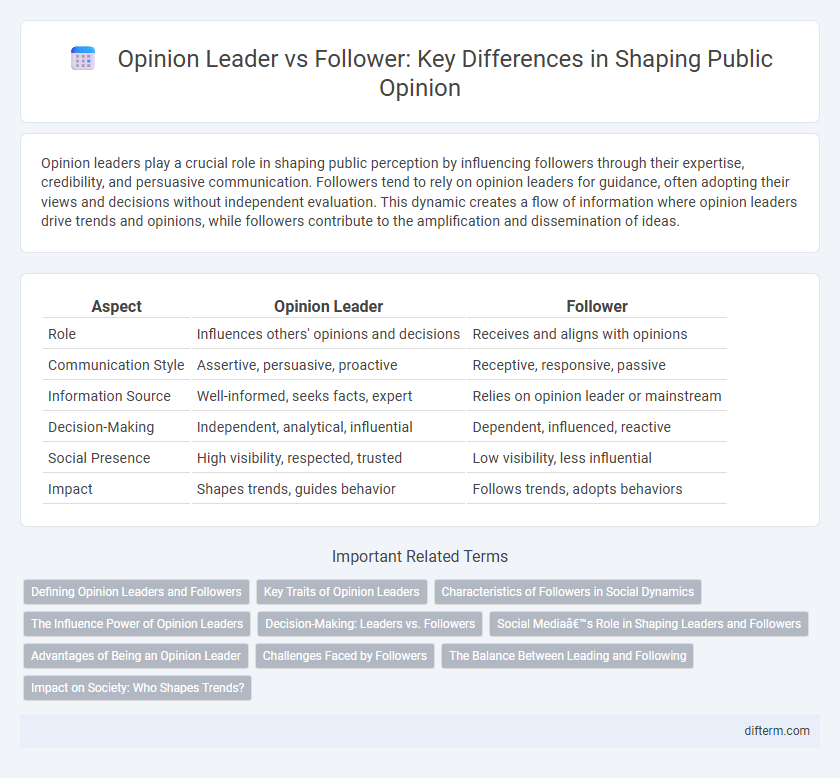Opinion leaders play a crucial role in shaping public perception by influencing followers through their expertise, credibility, and persuasive communication. Followers tend to rely on opinion leaders for guidance, often adopting their views and decisions without independent evaluation. This dynamic creates a flow of information where opinion leaders drive trends and opinions, while followers contribute to the amplification and dissemination of ideas.
Table of Comparison
| Aspect | Opinion Leader | Follower |
|---|---|---|
| Role | Influences others' opinions and decisions | Receives and aligns with opinions |
| Communication Style | Assertive, persuasive, proactive | Receptive, responsive, passive |
| Information Source | Well-informed, seeks facts, expert | Relies on opinion leader or mainstream |
| Decision-Making | Independent, analytical, influential | Dependent, influenced, reactive |
| Social Presence | High visibility, respected, trusted | Low visibility, less influential |
| Impact | Shapes trends, guides behavior | Follows trends, adopts behaviors |
Defining Opinion Leaders and Followers
Opinion leaders influence group attitudes and behaviors by shaping public perception through expertise, credibility, and social status in specific domains. Followers rely on these leaders for information and guidance, often adopting opinions and actions aligned with leaders' perspectives. The distinction hinges on authority in communication flow, where leaders initiate and shape dialogue while followers absorb and respond.
Key Traits of Opinion Leaders
Opinion leaders exhibit strong communication skills, credibility, and the ability to influence group behaviors and attitudes effectively. They possess expertise in specific areas, foster trust within their communities, and actively engage in sharing insights that shape collective opinions. Their proactive stance on information dissemination distinguishes them sharply from followers who tend to adopt views without critical analysis.
Characteristics of Followers in Social Dynamics
Followers in social dynamics demonstrate loyalty and openness to influence, often valuing guidance and clear direction from opinion leaders. They tend to seek social validation and align their attitudes, behaviors, or beliefs with group norms to maintain cohesion and reduce uncertainty. Their characteristics include adaptability, compliance, and a preference for consensus within peer networks.
The Influence Power of Opinion Leaders
Opinion leaders wield significant influence power by shaping the attitudes, beliefs, and behaviors of their followers through credible knowledge and trusted expertise. Their ability to frame narratives and introduce innovations accelerates social change and consumer decisions within targeted communities. Followers often rely on opinion leaders for guidance, amplifying the leaders' impact across social networks and market dynamics.
Decision-Making: Leaders vs. Followers
Opinion leaders influence decision-making by shaping perceptions and guiding choices through expertise and credibility, often driving innovation and change within a group. Followers tend to rely on the insights provided by opinion leaders, which can streamline decision-making but may also limit independent critical thinking. This dynamic highlights the importance of balancing authoritative guidance and autonomous evaluation to optimize collective decisions.
Social Media’s Role in Shaping Leaders and Followers
Social media platforms amplify the influence of opinion leaders by providing real-time engagement and vast audience reach, enabling rapid dissemination of ideas and trends. Followers are shaped by algorithms that tailor content to reinforce existing beliefs, creating echo chambers that strengthen leader authority. The dynamic between opinion leaders and followers on social media drives cultural shifts and consumer behavior with unprecedented speed and scale.
Advantages of Being an Opinion Leader
Opinion leaders hold significant influence in shaping public perceptions and driving social trends, which allows them to impact decision-making processes across various industries. Their ability to access and disseminate accurate, timely information fosters trust and credibility among their audiences, positioning them as key catalysts for change. Being an opinion leader often results in enhanced networking opportunities and greater visibility, which can lead to increased professional growth and authority within their field.
Challenges Faced by Followers
Followers face challenges such as limited influence on decision-making processes and reliance on the guidance of opinion leaders, which can hinder independent thinking. They often struggle with the pressure to conform to prevailing opinions, leading to reduced creativity and self-expression. Navigating the balance between support and critical evaluation is crucial for followers to maintain their authenticity and contribute meaningfully.
The Balance Between Leading and Following
Opinion leaders shape public perception by confidently guiding discussions and setting trends, influencing the decisions of their followers. Followers contribute by critically evaluating and selectively adopting ideas, fostering a dynamic exchange that refines collective views. Achieving a balance between leading and following enhances social progress and innovation through collaborative dialogue.
Impact on Society: Who Shapes Trends?
Opinion leaders play a pivotal role in shaping societal trends by influencing public attitudes, behaviors, and consumption patterns through their credibility and expertise. Followers contribute to trend propagation by adopting and amplifying these ideas, yet the initial direction and innovation stem primarily from opinion leaders. The dynamic interaction between leaders and followers drives cultural evolution and market shifts, highlighting the disproportionate impact opinion leaders have on societal change.
Opinion leader vs Follower Infographic

 difterm.com
difterm.com